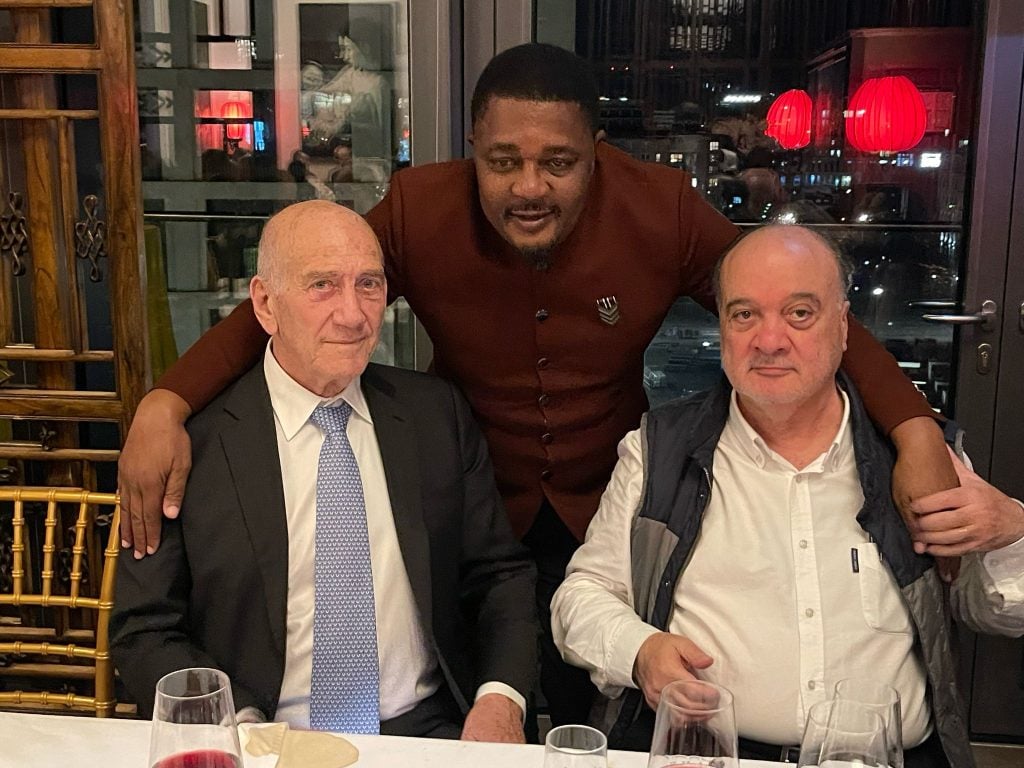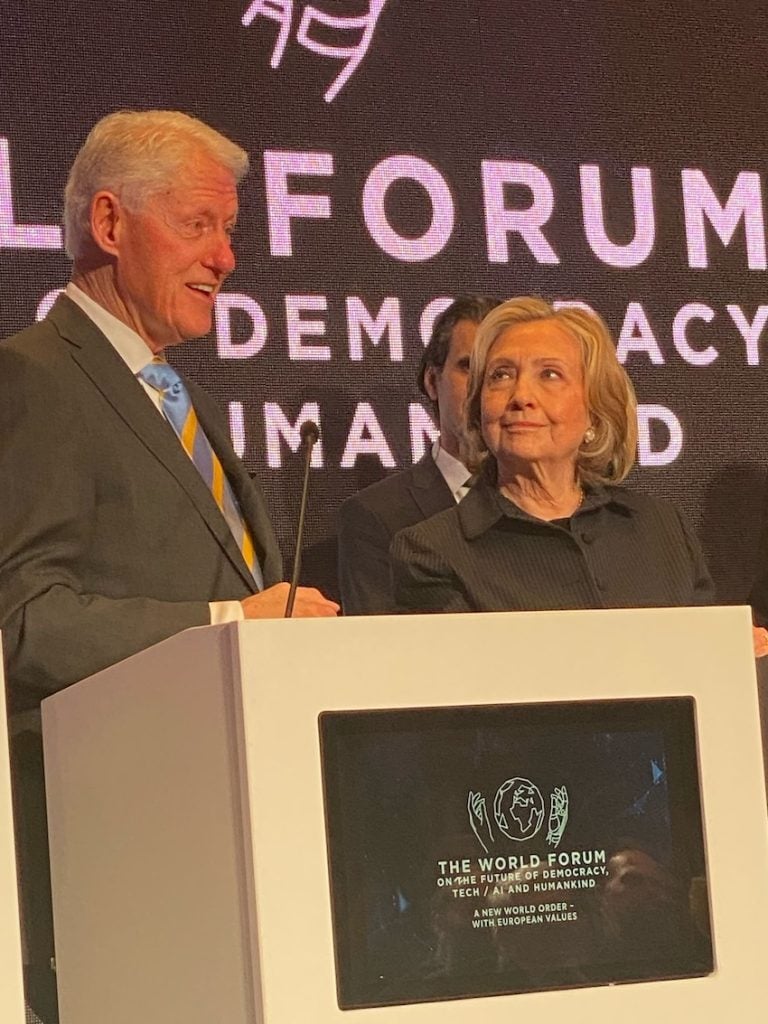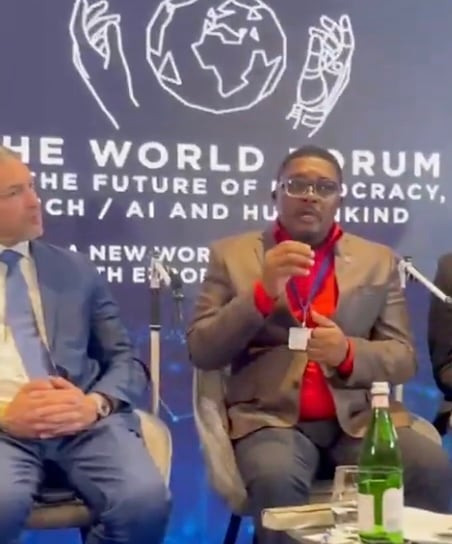On March 18 and 19, THE WORLD FORUM in Berlin, Germany , ON THE FUTURE OF DEMOCRACY, AI/TECH, AND HUMANKIND promoted a renewal of democracy and presented suggestions, policy papers, and law drafts on how to improve the state of the world.
THE WORLD COUNCIL ON AIdeveloped a framework for AI, Algorithms, social media, and digital life to elevate and not endanger democracy, freedom, and humankind.
Former Minister of Tourism and Foreign Minister for Zimbabwe, a former candidate for UN Tourism Secretary-General, took the stage to present the African perspective as a son of Africa and a global citizen.
THE WORLD FORUM heard remarks by Pope Francis, US President Bill Clinton, Secretary Hillary Clinton, Philosopher Yuval Noah Harari, Geoffrey Robertson KC, First Lady of Ukraine Olena Zelenska, Vice-President of the European Parliament Katarina Barley, former Prime Minister of Israel Ehud Olmert, former President of Afghanistan Hamid Karzai, former President of Tunisia Moncef Marzouki, Nobel Peace Laureates Oleksandra Matviichuk, Maria Ressa, Tawakal Kerman, Narges Mohamadi (from Iran prison), Russian opposition leaders Vladimir Kara-Murza and Ilya Yashin, the world’s leading scientist on longevity Professor David Sinclair on how to stop aging and extend human lifespan.
Among the 200 speakers at The World Forum`s 50 panel discussions are the world’s leading minds in their fields, such as the ethicist Peter Singer, the first female Muslim Imam, and the Godfathers of AI, such as Yoshua Bengio.
Global Think Tanks are constituted mainly by former Public Servants, Bureaucrats, politicians, academicians, and interdisciplinary scholars whose purpose is to Research a wide range of policies, issues, or ideas, including but not limited to Political Strategy, Social, economic, and Public Policies, Culture, and Technology.
It is global practice for Politicians to retire into these publicly and privately funded Institutions, and most Governments use them as Policy sounding boards.
Dr. Walter Mzembi told eTN:
Here I am standing between the 12th Prime Minister of Israel(2006-9), Ehud Olmert, and the former Foreign Affairs Minister of Palestine, Nasser Al Kidwa, nephew of the late PLO leader Chairman Yasser Arafat.

The two, who are working together globally to promote the two-state solution to the perpetual Israeli-Palestinian conflict, are a fine example of cultural diplomacy.
I met them to discuss our own Think Tank and its Global and continental Vision and thrust—on contributing to closing the Global Diplomacy Deficit, Conflict Resolution and management, Diplomacy Mentorship, Training, and Education, and taking the practice of cultural diplomacy to the grassroots, shop floor, and community level.
Many conflicts, including party factionalism, a rampant conflict practice, are resolved by cultural diplomacy and dialogue.

Mzembi added, “We honored Bill Clinton with the ” Peacemaker of the Century” award for his role in PeaceMaking in the Balkans.

Dr. Mzembi’s address at the World Forum on the Future of Democracy:
Distinguished guests, esteemed colleagues, ladies and gentlemen,
I stand before you today as a son of Africa and a global citizen, deeply invested in the intersections of diplomacy, governance, and sustainable development.
This gathering could not be more timely. The world finds itself at a pivotal moment when democracy is under siege, global power dynamics are shifting, and technology is reshaping societies in unprecedented ways. The question before us is no longer whether change is happening but how we will shape it.
Nowhere are these challenges more pronounced than in Africa, a continent of extraordinary potential but also of persistent contestation between history and modernity, sovereignty and global influence, and its developmental ambitions and the strategic interests of external actors.
Africa
Isn’t it fortuitous that this global forum is taking place at a time when SADC, The East African Community, The African Union, The European Union, and indeed The United Nations itself are ceased with a perennial conflict in the Eastern Democratic Republic of Congo?
This was created by the partition of Africa and was conceived in this city, Berlin. This partition resulted in the creation of 55 sovereign states, some viable and some non-viable. Still, more importantly, the source of this conflict alluded to is that it separated homogeneous cultural communities with straight lines that we call borders today.
External actors’ extractive exploits in Africa and in the DRC are a major source of conflict in Africa and geopolitical contestations between East and West over who gets the bulk of Africa’s raw materials and resources.
One of the defining shifts in Africa’s international engagements over the past two decades has been its deepening ties with the East, particularly China and other key Eastern partners such as Russia, India, and Turkey.
This strategic pivot is underpinned by economic pragmatism and a recognition that Africa must diversify its alliances to advance its developmental goals.
The numbers tell a compelling story: China alone has pledged over $1 trillion in infrastructure, mining, and energy investments across Africa, with additional financing from Russia in security and nuclear energy and India in pharmaceuticals and technology.
The Belt and Road Initiative (BRI) continues to redefine Africa’s economic geography, linking over 46 African nations to China’s trade and logistics networks.
By contrast, the West, particularly the United States, has struggled to maintain the same level of engagement.
U.S. direct investment in Africa has declined by 30% over the past decade, while the U.S. International Development Finance Corporation (DFC) has committed a modest $60 billion to Africa—a fraction of what China has poured into the continent.
The EU’s Global Gateway Initiative, aimed at countering China’s BRI, has committed €150 billion. Yet, much of it remains in bureaucratic limbo, failing to match the speed and efficiency of its Eastern competitors.
However, while Eastern investments have catalyzed growth, they are not without their complexities. Concerns about debt sustainability, transparency, and the overarching implications for Africa’s sovereignty have emerged.
Many African states are now negotiating debt restructurings with China, with Zambia serving as a cautionary case study of how infrastructure-led development can lead to fiscal vulnerabilities.
Africa does not reject the West or embrace the East uncritically. Rather, it seeks engagement on its own terms—through partnerships that acknowledge its aspirations, respect its sovereignty, and support its development trajectory without imposing ideological conditions.
If the West is to compete with the East in Africa effectively, its approach must shift from traditional aid-based diplomacy to genuine, mutually beneficial partnerships.
The future of Western-Africa relations cannot be anchored solely in development assistance or military cooperation. Still, it must be grounded in economic opportunity, technological collaboration, and most crucially, cultural diplomacy.
Cultural diplomacy is often underestimated in global geopolitics, yet history demonstrates its enduring power. During the Cold War, the United States leveraged cultural diplomacy through institutions such as the United States Information Agency (USIA), broadcasting Western ideals and engaging directly with global audiences through art, music, and literature.
Today, the world is no less ideological, and as digital information warfare accelerates, cultural engagement remains a critical tool for influence and cooperation.
Africa, with its rich heritage, diverse linguistic and artistic traditions, and a youthful, globally connected population, presents an extraordinary opportunity for both the West and the East to reinforce relationships through cultural diplomacy. But this requires more than performative gestures—it demands a fundamental shift in policy and investment.
One of the most effective ways to achieve this is by strengthening Non-Governmental Organisations (NGOs) that specialize in cultural exchange, education, and civic empowerment.
My work in cultural diplomacy has demonstrated that when people-to-people ties are strengthened, political and economic relations inevitably follow. Studies by Nye (2004) on soft power confirm that nations that engage with others through cultural means—not just economic and military coercion—tend to foster more sustainable and cooperative relationships.
The support of NGOs is, therefore, not a matter of philanthropy but a strategic imperative. African NGOs are at the forefront of local governance, education, and cross-cultural engagements, yet they often lack the institutional capacity to scale their impact. Peer-reviewed research by Edwards and Hulme (2015) highlights that donor-driven NGO models frequently fall into the trap of dependency, unable to assert their autonomy due to funding constraints and shifting geopolitical priorities.
Suppose the West is serious about fostering a lasting presence in Africa. In that case, it must invest in the sustainability of these organizations rather than using them as transient instruments of policy objectives.







